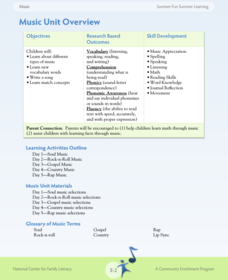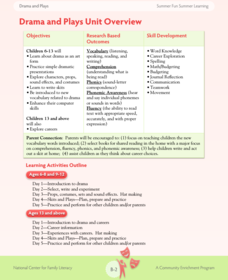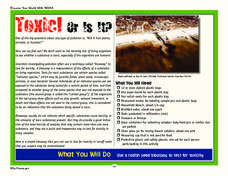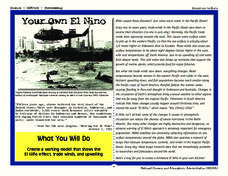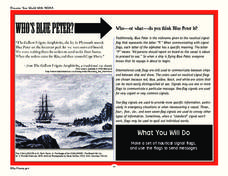University of Southern California
What Lives In The Ocean?
One of the most diverse environments on Earth is the ocean. Young scientists explore the living things found in the ocean during an exciting seven-lesson unit. Their study includes organisms from plankton to invertebrates and vertebrates...
University of Southern California
What Is The Ocean?
Go on a tour of the ocean through the lens of a scientist. Learners read maps of the ocean floor, study tide behavior, examine wave motion, and analyze components of soil. Each lesson incorporates a hands-on component.
University of Southern California
What's the Catch?
There must be a catch! A comprehensive lesson looks at ocean fishing concerns through a set of five hands-on activities. Learners become aware of the risks of seafood contamination and factors that have affected the ocean environment.
Cornell Lab of Ornithology
Investigating Evidence
Explore the scientific process through nature. Scholars become scientists as they develop a question, design an experiment, collect data, and analyze their results. A two-week lesson guides your classes through the process and provides...
Agriculture in the Classroom
"Steer" Toward STEM: Careers in Animal Agriculture
Think like an engineer and an agricultural scientist over the course of 12 lessons in a STEM based unit. Young scientists take on the roles of animal physiologists, animal geneticists, agricultural engineers, animal nutritionists, and...
University of Alaska
Clay Model Earth
What a great way to incorporate hands-on learning while teaching about the earth's layers. The class observes an overhead transparency (linked in Included Materials) as they create their own model Earth using different colors of clay....
National Center for Families Learning
The Summer Fun Summer Learning Music Unit
Take note. Soul music. Gospel music. Country music. Summer comes alive with the sounds of music as program participants learn about various genres of music, create instruments, and write and perform songs about the facts and traditions...
National Center for Families Learning
The Summer Fun Summer Learning Drama and Plays Unit
The play's the thing that puts the play in a summer learning drama program designed to combat summer slide and encourage family literacy. Participants learn about drama as an art form, engage in dramatic presentations, write scripts, and...
National Center for Families Learning
The Summer Fun Summer Learning Dance Unit
Summer slide. Alas, not a term synonymous with a type of sliding board, summer slide refers to the fact that learning slips during summer break, especially in the areas of spelling and math facts. Enrich summer break with a...
National Center for Families Learning
The Summer Fun Summer Learning Poetry Unit
Focus on poetry this summer to enhance those comprehension, fluency, and language skills with a set of resources intended to explore different types of poetry, specifically lyric poetry. The daily activities contain differentiation ideas...
NOAA
Toxic! Or Is It?
Super scientists tests the toxicity of water using radish seed bioassays. Over the course of five days, scholars observe the germination process of several radish seeds, looking closely at their roots to determine the level of toxins...
NOAA
It All Runs Downhill
Examine how pollution makes its way into an ocean with help from a model watershed. Scholars use household items to recreate a mini-watershed, equipped with pollutants, that when mixed with rain drain into a model's body of water. After...
NOAA
Please Pass the Salt
Salinity is the focus of two experimenters that work to answer the question, How does salt change the physical properties of water? Super scientists compare the freezing rate of salt and fresh water, combine the two waters to observe how...
Possibilities
Disability Awareness Activity Packet
Bring awareness to disabilities with a packet consisting of a variety of activities designed to inform scholars about disabilities—autism, hearing impairments, physical disabilities, and more! Learners test their communication skills,...
NOAA
Wooly Magma
Model the earth's core with a neat activity that uses science as an inquiry and step-by-step procedures. The activity acquires a lot of assistance from the teacher or volunteer helpers.
NOAA
Satellite Communications
How do satellites communicate? What types of satellites orbit Earth? Discover and mimic the way satellites communicate between two points in a hands-on activity that has pupils using mirrors, flashlights, and marbles.
NOAA
Your Own El Nino
Scholars make a model to discover how the force of trade winds over the Pacific Ocean creates an El Niño. Super scientists observe how the severe weather affects life in water and on land.
NOAA
Endangered Species Origami
Make sea turtle or whale origami in a hands-on activity that provides instructions for folding and facts for learning about each.
NOAA
Make an Edible Coral Reef
Coral reefs are full of an abundance of life and color. Why not celebrate it with an edible coral reef? Learners and teachers alike use cake, icing, and candies to create a tasty version of a coral reef that's complete with colors,...
NOAA
Motion from the Ocean
Create a fish mobile using cardboard and string to hang in the classroom while studying ocean life. Each printable requires pupils to cut out two of the same fish to create consistency on the front and back.
NOAA
Tornado in a Bottle
Studying the science of tornadoes? Make a tornado in a bottle to demonstrate how vortexes are formed in tornadoes. The activity should be used as a way to demonstrate what pupils already know about tornadoes.
NOAA
Make Your Own Volcano!
Make a volcano erupt in your own classroom! Young scientists use household and craft materials to model and simulate the eruption of a volcano.
John F. Kennedy Presidential Library & Museum
Ask Not What Your Country Can Do for You
Ask not what the lesson here can do for you, but what you can do with the lesson. The answer is quite a lot! Young scholars revisit JFK's famous inaugural address with a focus on his plea for civic engagement. There's a letter to JFK...
NOAA
Who’s Blue Peter?
Scholars discover who Blue Peter is and how sailors used nautical signal flags on the open waters in order to create their own set of nautical signal flags and send messages to peers.








